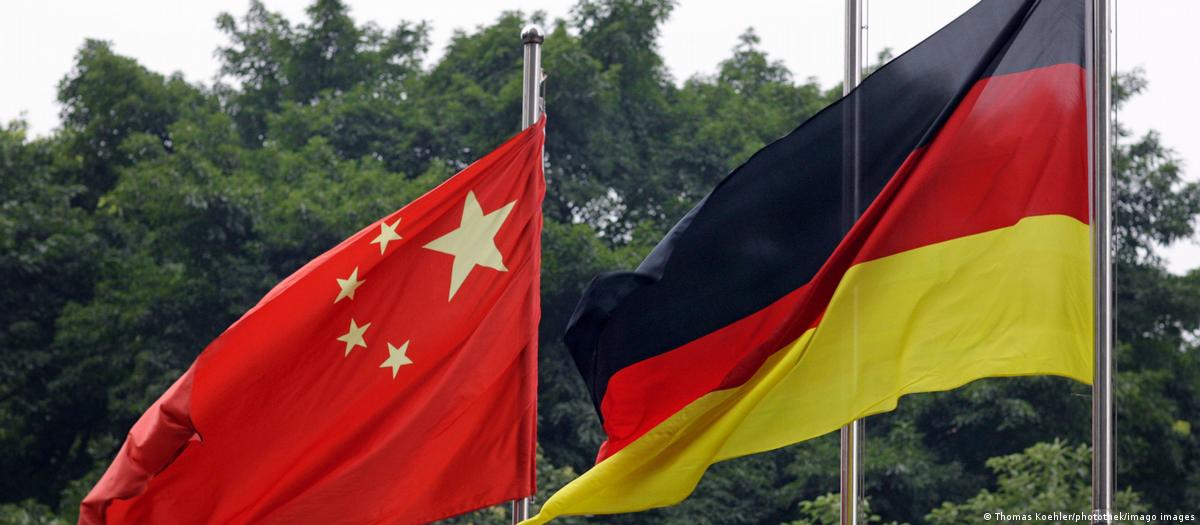Governmental consultations between the two countries were once an expression of a close relationship. Now, ties are overshadowed by systematic rivalry – but at least there is still a dialogue.
(DW) “Acting together sustainably”. That is the motto of the governmental consultations between Germany and China, for which China’s Premier Li Qiang arrives in Berlin on Monday (June 19) with a large part of his cabinet.
As far as common ground is concerned, the distance between Beijing and Berlin seems to be narrowing. This was evident in the most recent meeting between a German cabinet member and a Chinese government representative – the meeting between German Defense Minister Boris Pistorius and his counterpart, Li Shangfu, on the sidelines of a security conference in Singapore. The meeting addressed a recently revealed Chinese air force training program – with the participation of former German fighter pilots. In very clear words, Pistorius called “for this practice to be terminated immediately.”
Thorsten Benner of the Berlin think tank German Public Policy Institute (GPPI) sees the incident as “an indication that we need to be vigilant. Because Beijing uses every opportunity to gain access to critical technologies or capabilities in order to strengthen its own industrial and military base.”
The Friction Area Grows
Whether it’s the procurement of technology, Beijing’s adherence to its “solid friendship” with Moscow despite Russia’s invasion of Ukraine, the growing tensions in the Taiwan Strait, the repression of the Uighur minority in China: the areas of friction are growing. And it is intensified by the emerging great power’s geopolitical rivalry with the US.
At the same time, China remains Germany’s most important trading partner for the seventh time in a row. In 2022, the trade flow reached almost 300 billion euros – with a huge deficit on the German side of more than 80 billion euros.
The relationship is not only significant, but also complex. The whole contradictory nature of German-China relations is already evident in the fact that official documents refer to China as a partner, competitor and strategic rival at the same time.
In the past, Berlin had emphasized the partnership aspect. The governmental consultations – which have existed since 2011 – are a testimony to this: this high-level intergovernmental dialogue is only held with particularly close partners. In 2014, relations between Germany and China were even elevated to the category of “comprehensive strategic partnership.” But since then, the climate has changed – in Berlin and in other European capitals. The nature of relations has clearly changed to strategic rivalry.
This will also have an impact on the 7th round of government consultations, hopes Barbara Pongratz of the Berlin-based think tank Merics. “The German government wants to say goodbye to ‘business as usual,'” says the German-Chinese relations expert. “There are signs that the government’s consultations will be accompanied by comparatively few public signals and no announcement of major trade contracts.”
The new style of German China policy was already noticeable in the coalition government agreement, signed between Social Democrats, Greens and Liberals. China is mentioned 12 times in the document. It is also classified as a strategic rivalry – and cooperation with European partners. “To enable our values and interests in the systemic rivalry with China, we need a comprehensive China strategy for Germany within the framework of the joint EU-China policy. We want to follow up on intergovernmental consultations and make them more European,” the text reads.

No China strategy
“But there is no real debate about the Europeanization of Germany’s relations with China, the China strategy or government consultation,” Pongratz criticizes. In addition to the fact that the announced China strategy is not even available yet. It is supposed to be based on the recently released National Security Strategy. Also due to differences of opinion within the coalition.
Political scientist Eberhard Sandschneider considers the delay of this German China strategy “quite favorable” with regard to the climate of the talks. “If an overly critical document regarding China were to be published now, we would certainly have to assume that Chinese self-confidence would lead to the cancellation of the consultations,” says the China expert. He adds, “And everyone knows, including the Chinese, that the German government has internal differences on the issue.”
Divergences within the government
No wonder: the dispute is being fought publicly. Especially between the Greens, who claim to be values-oriented and adopt a tough tone toward China, and the Social Democratic Party (SPD), which also has its eye on economic interests. While, for example, Foreign Minister Annalena Baerbock of the Greens sought an open exchange of criticism of her counterpart Qin Gang during a visit to Beijing in April, the conservative wing of the SPD parliamentary caucus published a position paper on German China policy. In it, the parliamentarians call for a pragmatic policy and warn against an anti-Beijing strategy.
Barbara Pongratz points out that major differences have been perceived between Baerbock and the German Federal Chancellor, Social Democrat Olaf Scholz, and that party politics has influenced German policy toward China. “If you listen carefully, you will notice that there are differences in tone. But in their messages they don’t differ that much,” the China expert assesses.
In government consultations, it is Scholz who has the chair. This may contribute to a friendly tone, despite all the harshness of the subject. China expert Sandschneider has few concrete expectations of tangible results. For him, the most important thing is that the consultations take place – after three years without large-scale personal meetings. “I agree with the Chinese colleagues I talk to: it is urgent that they meet again. And not only in the official conference sessions, but also in the famous coffee breaks, to exchange a personal word with each other. That changes the atmosphere.” And perhaps it will make “joint sustainable action” possible, at least on some points.
